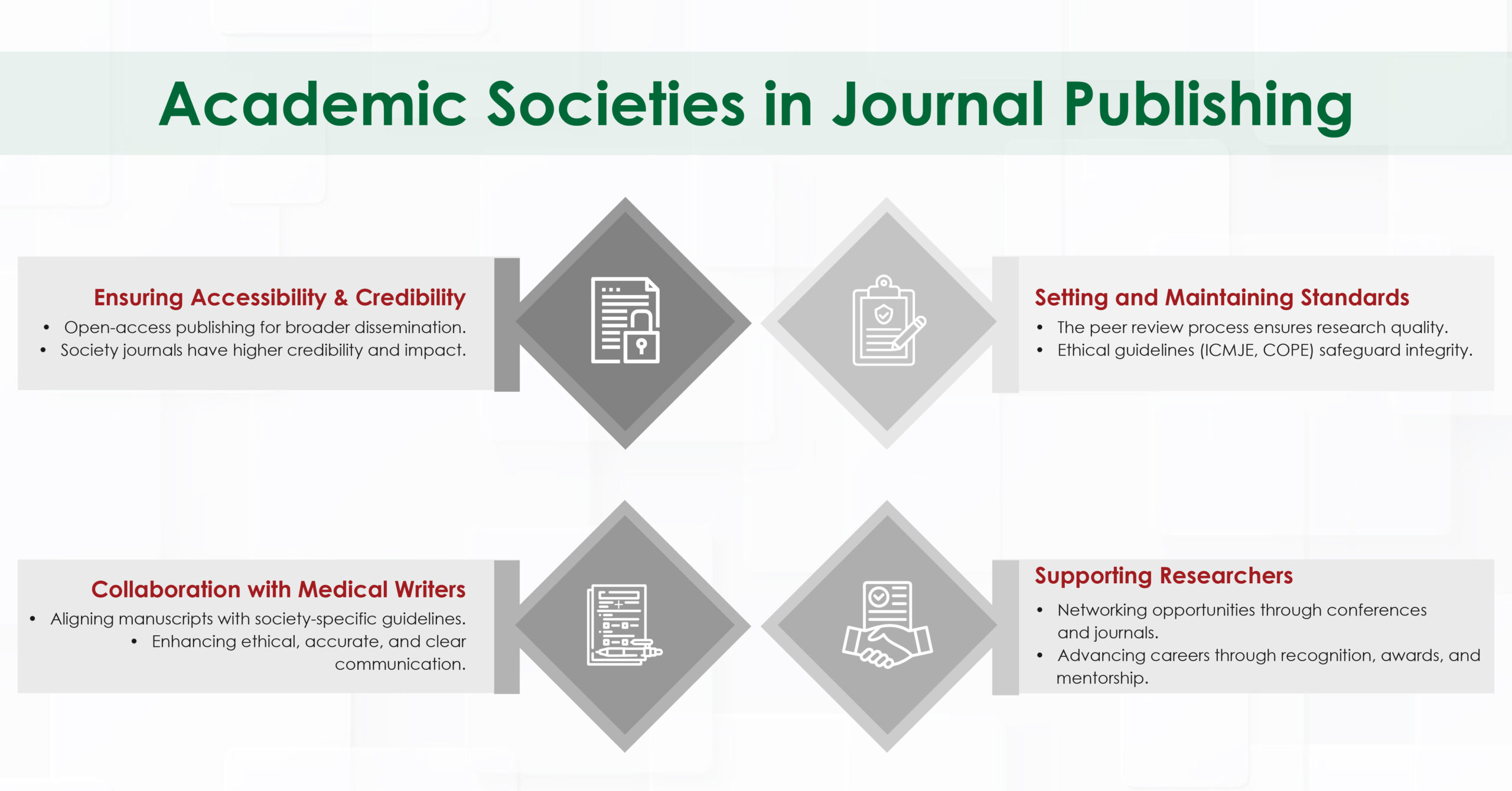Academic societies have long been integral to the advancement of research, education, and professional development in various fields. In the journal publishing, their influence is particularly notable. These organizations are often at the forefront of disseminating new scientific discoveries, setting rigorous standards for academic integrity, and fostering the growth of researchers through peer-reviewed publications. For medical writers, understanding the contributions of academic societies to journal publishing is essential, as it informs their work and ensures that the content they produce aligns with their highest academic and ethical standards.
- Setting and Maintaining Publishing Standards
One of the primary contributions of academic societies to journal publishing is their role in setting and maintaining high standards of scientific and academic content. These standards ensure that the research published in their journals is credible, rigorous, and adheres to the ethical guidelines.
- Peer Review Process
The peer review process is a key mechanism by which academic societies maintain their publishing standards. Most academic journals, especially those affiliated with societies, require manuscripts to undergo rigorous peer review before publication. This process involved expert reviewers who evaluated the quality, originality, and validity of the research. By providing an independent assessment, peer review helps maintain the integrity of published research and prevents the dissemination of flawed or misleading findings.
For medical writers, the peer review process is both a guide and safeguard. When preparing manuscripts, regulatory documents, or clinical trial summaries, medical writers must ensure that their content meets the criteria set by the reviewers. This implies paying close attention to data accuracy, clarity of communication, and adherence to ethical standards.
- Ethical Guidelines and Reporting Standards
Academic societies are instrumental in developing ethical guidelines and reporting standards for research publications. These include principles such as transparency in data reporting, disclosure of conflicts of interest, and adherence to ethical guidelines in human and animal research. For example, organizations like the International Committee of Medical Journal Editors (ICMJE) and Committee on Publication Ethics (COPE) have established widely accepted standards for manuscript preparation and publication ethics.
Medical writers working in the field of journal publishing must be familiar with these guidelines to ensure that their work complies with the industry norms. By adhering to the standards set by academic societies, medical writers contribute to the credibility and ethical standing of their research.
- Supporting Researchers: Providing a Platform for Scientific Dialogue
Another critical role that academic societies play in journal publishing is to provide a platform for researchers to share their findings, exchange ideas, and collaborate with their peers. By publishing journals, academic societies facilitate the dissemination of knowledge, ensuring that discoveries are accessible to the scientific community.
- Encouraging Collaboration and Networking
Many academic societies organize conferences, workshops, and symposiums in addition to publishing journals. These events serve as valuable networking opportunities for researchers, where they can discuss their work with other professionals, receive feedback, and collaborate. For early career researchers, academic societies offer mentorship and support, helping them navigate the often-complex publishing process in high-impact journals.
Medical writers, particularly those involved in preparing research for publication, benefit from resources and networking opportunities provided by academic societies. Attending society-sponsored events or engaging with the latest journal articles allows medical writers to stay updated on emerging research trends, new methodologies, and shifts in the regulatory field.
- Advancing Careers Through Recognition
Academic societies often have awards or recognition programs that honor outstanding research contributions. This recognition not only advances the careers of researchers, but also brings attention to important scientific discoveries. Many societies also offer travel grants, fellowships, and scholarships, to further support researchers in their professional development.
Medical writers, who often collaborate with researchers in preparing manuscripts and grant proposals, can help their clients or employers navigate these opportunities for recognition. By aligning their work with the high standards and expectations of academic societies, medical writers play a role in helping researchers advance their careers and secure the recognition of their contributions.
- Ensuring Accessibility and Credibility in Scientific Publishing
In recent years, the open-access movement has gained significant momentum, with the aim of making research freely available to a wider audience. Academic societies have been key players in this movement, with many offerings open-access options for their journals or participating in initiatives like Plan S, which promotes the unrestricted availability of scientific publications. By supporting open access, academic societies can help bridge the gap between researchers, clinicians, policymakers, and the public.
Read More: The Evolution of Academic Publishing: From Print to Digital
- Enhancing Accessibility Through Open Access
The open-access model offers unique opportunities and challenges for medical writers. On one hand, open-access publications allow medical writers to access a wealth of research data and articles without barriers to paywalls. This is particularly useful when preparing literature reviews or drafting content that requires a comprehensive understanding of current research. However, open-access journals often require authors or their institutions to cover publication costs, which can be a financial burden for some researchers.
- Upholding Journal Reputation and Impact
The reputation of a journal is often linked to the academic society that supports it. Journals affiliated with respected societies typically have higher impact factors, attract submissions from leading researchers, and maintain strict editorial standards. For medical writers, publishing in a high-impact journal can significantly enhance the visibility and credibility of the research they are helping communicate.
When preparing manuscripts, medical writers should consider the impact and reach of the journals they are targeting. Submitting work to society-affiliated journals that maintain high editorial standards can improve the likelihood of publication and ensure that research reaches the intended audience.
- Supporting Medical Writers: Collaboration Between Writers and Academic Societies
Academic societies are not only beneficial to researchers; they also play a crucial role in supporting medical writers. Many societies offer specialized resources to writers, including style guides, ethical guidelines, and access to professional networks. For example, organizations such as the American Medical Writers Association (AMWA) and European Medical Writers Association (EMWA) provide valuable training opportunities and certifications for medical writers.
- Continuing Education and Professional Development
By collaborating with academic societies, medical writers can access continuing education opportunities that will help them stay current in their fields. Many societies offer workshops, webinars, and online courses that cover topics, like manuscript preparation, ethical writing practices, and advancements in medical research.
These educational opportunities not only enhance the skills of medical writers, but also contribute to the overall quality of the research publications they help produce. By being informed about the latest trends in medical writing and journal publishing, writers can improve the accuracy, clarity, and ethical standards of their work.
- Bridging the Gap Between Researchers and Publishers
Medical writers often serve as intermediaries for researchers and publishers. By understanding the standards and requirements of academic societies, medical writers can help researchers navigate the publication process smoothly. This includes preparing manuscripts that meet society-specific guidelines, ensuring compliance with ethical standards, and facilitating clear communication between the authors and journal editors. Through this collaboration, medical writers contribute to the successful dissemination of research, ensuring that it reaches the right audience and has a lasting effect on the scientific community. The role of academic societies in journal publishing is essential to maintaining the integrity, accessibility, and credibility of scientific research.
At Turacoz, we understand the pivotal role academic societies play in setting rigorous standards for ethical and credible scientific communication. Our expert medical writers are dedicated to producing content that not only meets these high standards but also contributes to advancing scientific knowledge. Leveraging the resources and guidelines provided by academic societies, we ensure the accuracy, credibility, and impact of the research we help communicate. We stay updated on emerging trends and innovations in publishing, such as open-access platforms and transparent peer review processes, guiding researchers through the complexities of today’s academic landscape. By partnering with Turacoz, you gain a dedicated ally who is equipped to elevate your research, ensuring it meets the highest academic standards while reaching the widest possible audience. Visit www.turacoz.com or contact us at [email protected] to learn how we can support your publishing journey







































